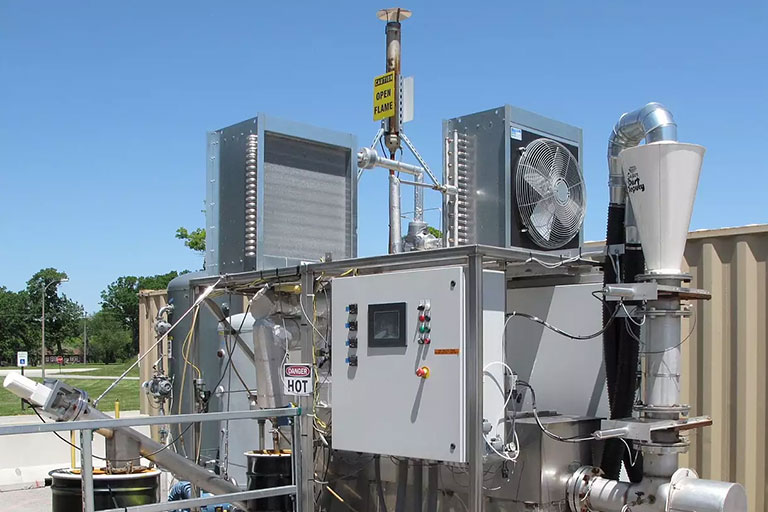Floods. Drought. Invasive species. These are real problems facing Hoosiers and citizens around the globe. Researchers with IU's Environmental Resilience Institute are conducting on-site research in nearly half of Indiana’s 92 counties to accurately predict changes in climate, groundwater systems, vegetation, wildlife and more. They are working to accelerate the adoption of climate solutions in Hoosier communities and are training the next generation of climate leaders.
Addressing environmental change
Featured stories

IU partners with local environmental leaders
An Indiana University spinup company focused on renewable energy will receive $100,000 through a program sponsored by the U.S. Department of Energy to build capacity for renewable energy projects in Indiana.
Learn about the projects
Utility disconnections in the US
The dashboard provides a resource to aid users in understanding the magnitude of the challenge of utility disconnections, as well as the limited protections that exist for households.
Read more about the dashboard
Rocks can save the atmosphere
An IU researcher investigates the critical geochemical processes that trap carbon dioxide in rock to better predict the potential for atmospheric carbon removal and storage at scale.
Learn more about their work48Local governments assisted with climate action and preparedness by IU’s Environmental Resilience Institute
#8is IUPUI's ranking in the U.S. for its commitment to the UN's Sustainability Development Goals
11local governments and a regional coalition partnering with IU's Environmental Resilience Institute to take action on climate change
Description of the video:
[Video: Fades in from black and Indianapolis skyline is shown]
[Music: music Fades in]
[Video: Daniel Johnson shows speaking at a desk with camera on his left.]
Daniel Johnson speaks in voiceover: My main research focus is on how environmental vulnerability is and social vulnerability interact.
[Video: Persective on Daniel Johnson switches to the camera on the right]
Daniel Johnson speaks: So, I've been studying extreme heat for over, over 15 years. My name's Dan Johnson. I'm a professor in the Department of Geography at IUPUI.
[Video: Climate change icon comes into frame]
Daniel Johnson speaks: We're probably almost ground zero for Midwest, at least, for climate change.
[Video: Man walking on the sidewalk in warm, sunshine weather]
Daniel Johnson speaking in voiceover: The extreme heat situation has just become a much bigger deal
[Video: People walking on sidewalk in warm, sunshine weather]
Daniel Johnson speaking in voiceover: I think, even than I thought it would be 15 years ago.
[Video: Daniel Johnson shows speaking at a desk with camera on his right.]
Daniel Johnson speaks: These things contribute to public health, too, or environmental disparities as well.
[Video: Woman and child sitting at fountain]
Daniel Johnson speaking in voiceover: This is directly affecting Hoosier lives, right.
[Video: People walking on a crosswalk in Indianapolis]
Daniel Johnson speaking in voiceover: I mean, we know there's connections in between the environment and health.
[Video: Smoke billowing out of a factory chimeny]
Daniel Johnson speaking in voiceover: We know there's problematic environments.
[Video: Fades to Daniel Johnson at desk]
Daniel Johnson speaks: And trying to figure out what all that interconnectedness is. And that's what a lot of my work tends to try to do, to help the general public prepare for extreme heat
[Video: Timelapse of IUPUI campus]
Daniel Johnson speaking in voiceover: Prepare for where it's more likely to be a problem.
[Video: Daniel Johnson using a mouse and keyboard at desk]
Daniel Johnson speaking in voiceover: As the climate changes,
[Video: Screen showing map of Indiana countries relative risk differential]
Daniel Johnson speaking in voiceover: all of these things are just going to become more and more of an issue.
[Video: Daniel Johnson shown teaching students using map]
Daniel Johnson speaking in voiceover: All the machine learning, artificial intelligence
[Video: Fade to Daniel Johnson at desk]
Daniel Johnson speaking: types of modeling that we're able to do the amount of data we're able to start getting it going to be a game changer in a lot of situations. I do this work to increase awareness to environmental injustices in especially vulnerable communities, across the United States.
[Video: Fades to Indiana University Research logo]
[Music: music Fades out]

